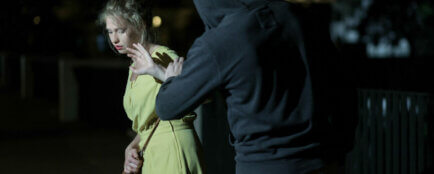The return of crime to the streets
After a few quieter years during the pandemic, crime in the Czech Republic has seen a resurgence. According to data from the Czech Police, over 173,000 crimes were recorded in 2024, including more than 94,000 property crimes and over 13,000 violent crimes.
These figures show that street crime, i.e. acts taking place in public space, such as robberies, pickpocketing and rioting, form a significant part of everyday reality, especially in larger cities.
What is street crime?
Street crime is not an official legal category, but a practical collection of acts that typically take place in public spaces: robbery, pickpocketing and casual theft (including shoplifting or theft from cars), disorder, intentional bodily harm, dangerous threats or extortion.
These acts have a common setting – they take place on the street, on means of transport, in shopping centres or in urban night-time areas.
In practice, the motivation of the perpetrators often differs: while rioting tends to be impulsive, pickpocketing is often the systematic activity of organised groups.
Are you solving a similar problem?
Need legal help after a robbery or theft?
Contact us, Affordable Lawyer offers online consultation within 24 hours.
I need some advice
- When you order, you know what you will get and how much it will cost.
- We handle everything online or in person at one of our 6 offices.
- We handle 8 out of 10 requests within 2 working days.
- We have specialists for every field of law.
Map of crime in the Czech Republic
The Police of the Czech Republic operates an online crime map where you can view an overview of reported crimes by region, city and street.
The map allows you to filter individual types of crime (e.g. property, violent, vice), track the time trend and compare city districts or even view the places with the most frequent occurrence of offences.
According to the 2024 map, Prague, Brno, Ostrava and Ústí nad Labem, the regions with the highest population and tourism density, remain the most risky areas.
Interestingly, even smaller cities are seeing an increase in so-called seasonal crime – for example, pickpocketing during summer festivals or Advent markets.
Year 2024 in the data
According to the Police data, in 2024 the number of crimes decreased by 4.5% compared to the previous year. A total of 173,322 crimes were committed in 2024. 54.7% of these crimes were solved (including after the fact). The damage caused amounted to CZK 30.96 billion, which is the highest in the last 5 years.
As far as property crime is concerned, 94 226 acts were committed, which means a year-on-year decrease of 6.1%. The most frequent crimes were fraud against a natural person, shoplifting, theft by burglary, unauthorised measure, forgery or alteration of means of payment and theft by breaking into motor vehicles. Most property crime took place in Prague (27%).
Violent crime included 13,708 offences in 2024, an increase of 4.5%. The most common offences committed by offenders were intentional bodily harm, violation of domestic liberty, dangerous threats or extortion and robbery. There were 151 murders, of which 69 were completed. The most dangerous regions in terms of violent crimes are the Moravian-Silesian Region and Prague.
Why does street crime vary between localities?
Street crime varies between localities for several interrelated reasons. The most significant factor is population density and the level of tourism. Places where large numbers of people move around on a daily basis naturally offer more opportunities for offenders to commit pickpocketing, robbery or petty property offences. A typical example is Prague, which has long had an above-average rate of property crime. Not only are there a high concentration of residents in the capital, but also tourists and visitors from all over the country, which creates an environment where it is easier to blend in and commit theft without being noticed.
Another important factor is the transport hubs and the so-called night-time economy. Around railway stations, public transport stops, clubs, bars and other places where people concentrate in the evening, the risk of theft, disorder or physical conflicts increases. These environments often combine alcohol, anonymity and lower vigilance, increasing the likelihood of incidents.
Social and economic factors also play a role. Statistics for 2024 show that some forms of crime, such as dangerous threats (+19.1%) and extortion (+17.3%), have seen significant increases. These trends are indicative of changing interpersonal conflicts and pressures in society – often spilling over into the online environment, where a combination of traditional and cyber forms of extortion or harassment are taking place. Regions with higher levels of unemployment, social exclusion or debt tend to be more prone to these phenomena.
Overall, therefore, street crime reflects both the demographic and economic conditions of a place and the quality of public space and the level of police or urban patrol presence. Areas with well-lit streets, an active community, and frequent checkpoints have a lower risk of crime than anonymous, congested, or neglected locations.
Tip for article
Tip: Learn when theft is a crime and when it is a misdemeanour and the difference between theft, concealment, robbery and embezzlement.
Crime prevention: what really works
Systemic prevention is managed by the Ministry of the Interior and municipalities under the annual Crime Prevention Programme. Individual projects target technical measures (lighting, camera systems), strengthening of the patrol service, work with youth and the elderly or cyber-prevention. However, there are measures that everyone can apply to protect themselves and their property.
Recommendations for citizens:
- On the street and on public transport, carry your purse/wallet in front of your body, and do not place your mobile phone anywhere on the table.
- Keepyour car locked, do not leave your belongings in plain sight (even a “cheap” handbag will make the perpetrator break the window).
- Night movement: choose lighted routes, avoid deserted places, use the possibility of sharing your location via mobile phone.
- IDs and cards: Get photocopies of your ID and other important documents, set limits on card payments and push notifications to alert you to suspicious payments you didn’t personally make.
- Teachyour children and seniors what to do in an emergency, remind them of the police number (158), and repeatedly discuss with them the principles of safe behaviour online and offline.
Recommendations for municipalities and businesses:
- Install lighting and cameras at all risk points (bus stops, passageways, parking lots).
- Provide patrols at night and on weekends, as a visible security presence reduces the incidence of offences and crimes.
- Collaborate with the police in data sharing, prevention events, and education for schools or nursing homes.
What to do if you become a victim of street crime
If you are a victim of a robbery or theft, call the police immediately (158), every minute increases the chance of catching the perpetrator. Have the crime report confirmed. Write down a description of the offender and all the circumstances while they are fresh in your mind. If necessary , block credit cards and documents. If someone has caused you bodily harm, see a doctor and keep all medical reports.
You then have the right to claim compensation from the state or damages from the perpetrator (known as a criminal complaint) (but only under the conditions defined by law, such as personal injury, etc.). If you are unsure how to file a criminal complaint or claim damages, our lawyers can help you.
Street crime in the Czech Republic is estimated to be in the tens of thousands of cases per year and its structure changes with technology and social conditions. If you become a victim, don’t handle the situation alone – the right legal action can be crucial to recovering damages and protecting you in the future.
Tip for article
Tip: Everyone has countless internet accounts these days. Whether it’s emails, social networking accounts, gaming accounts. As the number of these accounts grows, so too does the number of people misusing someone else’s identity on the internet or otherwise misusing their access data. Learn how to defend against them.
Summary
In 2024, the total crime rate in the Czech Republic fell by 4.5% to 173 322 crimes, with a clearance rate of 54.7%. While property crime fell slightly (-6.1%), violent crime rose (+4.5%) and there was a significant increase in dangerous threats (+19.1%) and extortion (+17.3%). Street crime – i.e. theft, robbery, disorderly conduct or assault – is most common in the public spaces of large cities, especially in Prague, Brno, Ostrava and Ústí nad Labem. Population density, tourism, transport hubs and night-time traffic increase the risk. The police operate an online crime map that allows them to track the development of crime by location. Prevention is based on a combination of systemic measures (CCTV, lighting, patrols) and individual caution – for example, not carrying valuables in plain sight, choosing lit routes or having set limits on card payments. Victims of theft or robbery should call the police immediately, write down details of the perpetrator, block cards and preserve evidence. In the event of damage or injury, compensation can be sought from the state or reimbursement from the perpetrator, and legal aid can significantly increase the chances of a successful claim.
Frequently Asked Questions
Where is the highest risk of street crime in the Czech Republic?
The highest number of crimes has long been recorded in Prague, Brno, Ostrava and Ústí nad Labem, i.e. in large cities with a high concentration of residents, tourists and nightlife. Especially around railway stations, public transport stops and night zones with bars and clubs are at risk.
What all is street crime?
The category includes offences taking place in public spaces, such as pickpocketing, robbery, rioting, intentional bodily harm, extortion or dangerous threats.
How can I protect myself from street crime?
Be cautious – carry your purse or wallet in front of your body, don’t leave things unattended, choose lighted routes and don’t walk alone in deserted places. Set limits on card payments and push notifications to alert you to suspicious transactions.
What should I do if I am a victim of robbery or theft?
Immediately call the police on 158, have a crime report form issued, write down the description of the offender and the circumstances of the incident. In case of theft of documents or credit cards, block them immediately.
Am I entitled to compensation if I am robbed or assaulted?
Yes. Victims of crime can claim compensation from the perpetrator or from the state (but only in cases provided for by law). In these situations, it is advisable to consult with an attorney to help with the process and pursuit of the claim.




